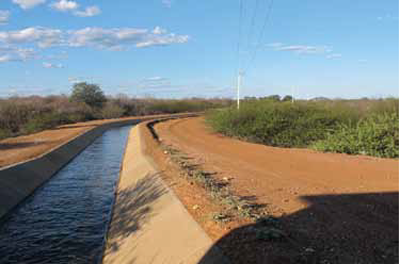Public Private Partnerships in Irrigation

Summary
The Government of Ghana has made private investment in infrastructure and services through Public Private Partnerships (PPPs) a development priority. This commitment is in response to a major infrastructure deficit, a narrow fiscal space, and a legacy of inefficient public service delivery. Improved infrastructure services are critical to economic growth. Ghana will draw on the private sector for new sources of capital and more effective service delivery mechanisms. One area needing reform is agricultural services, which includes irrigation. A World Bank technical team supporting the government in agribusiness and PPP development facilitated a knowledge exchange between Ghana and Brazil. Financed by the South-South Experience Exchange Facility, the exchange centered on extracting lessons from Brazil’s recent experience with PPPs, in particular the Pontal Irrigation Scheme. The exchange took place between July and September 2011 and included a week-long study tour to Brazil.
The knowledge exchange helped the Ghanaian participants expand their knowledge of Public Private Partnerships (PPPs). They learned how to handle risks, negotiate contracts, and build up the pertinent government institutions. They understood that political will is paramount to the success of PPPs, especially in the institutional building stage. The delegates also learned how to enact provisions to make the projects more attractive and marketable. They learned several important lessons from Brazil’s Pontal irrigation project that are directly applicable to the Accra Plains Scheme. These include the need for a strong water sector regulator, handling risk allocation in the project design, and connecting irrigation to commercial agriculture and infrastructure development. The lessons learned during the knowledge exchange also informed the design of two World Bank projects financed through the International Development Association (IDA): the Ghana Public Private Partnership Project and the Component 2 of the Commercial Agriculture Development Project, which focuses on establishing PPPs.
Beneficiaries / Participants
Despite rapid economic growth driven by exponentially increasing oil production revenues, Ghana remains fundamentally dependent on agriculture, with about one-third of the economy reliant on the sector. Moreover, agriculture there is largely a small-holder activity and at the mercy of the weather. Large areas are under-utilized but could become very fertile. The government’s agenda to modernize agriculture includes attracting commercial investment in production, agribusiness, and ancillary activities. In addition to improving the overall investment climate, the government was looking into more direct mechanisms for supporting sound investors. Ghana has recently formulated a National Policy on Public-Private Partnerships (PPPs) to catalyze private sector investment and spur job creation, improvements in infrastructure, and economic growth. Although the government is especially interested in large-scale irrigation, it is also keen to avoid enclave developments and to support small-holder participation as much as possible. The Ministry of Food and Agriculture (MoFA) and the Ministry of Finance and Economic Planning (MoFEP)i had identified the Accra Plains Irrigation Project as the initial PPP transaction in the agribusiness sector, building on previous investments and feasibility design work. The government also aims to convert its irrigation authority from an implementer to a regulator.
Brazil once faced a similar economic situation to Ghana’s, but through innovation and reforms it has achieved significant growth in the agricultural sector. Thus Ghana was interested to learn how the Brazilian Government incorporated key private and public stakeholders in setting the priorities of the transaction process to develop its agriculture. Using funding provided through the South-South Experience Exchange Facility, World Bank staff connected the two countries so Ghanaian officials could learn how to implement PPPs in large-scale irrigation. The Ghanaians wanted to learn how to identify existing capacity gaps, clarify roles, and inform the technical design, development timeline, and transaction structuring of the Accra Plains Irrigation Project. In addition, the World Bank is assisting Ghana in developing a PPP Investment Projectii and a Commercial Agriculture Project,iii in which PPPs in agribusiness are a central component.
Moving forward
The grant-supported activities fell directly in line with two International Development Association (IDA) projects that were under preparation at the same time. Component 2 of the Commercial Agriculture Project (P114264) is focused on building PPPs in the agribusiness sector and encompasses investment in the Accra Plains Irrigation Project. The project has identified 15,000 hectares for a substantial irrigation investment to be managed by a PPP to supply water to both large commercial farms and an outgrower scheme. Similarly, the proposed Ghana PPP Project (P125595) will make resources available to support PPPs in all key sectors as well as finance select PPP projects. This work builds on technical assistance work provided to the government over the last two years to assist in their planning and development of the PPP Program.

 China
China Colombia
Colombia Denmark
Denmark India
India Indonesia
Indonesia Mexico
Mexico Russian Federation
Russian Federation Spain
Spain United Kingdom
United Kingdom